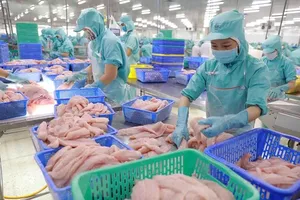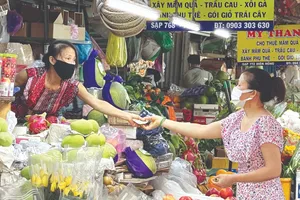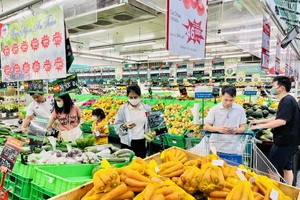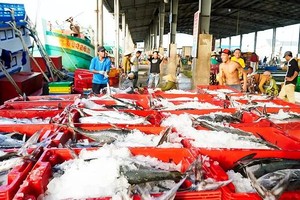
Seeing the seriousness of ASF in Vietnam, Deputy Minister of Agriculture and Environment Phung Duc Tien stressed that the ministry has directed officials to “join the front lines” and stamp out the epidemic as quickly as possible.
The Deputy Minister informed the current status of ASF and controlling methods in the country. Following several meetings of relevant units, the Prime Minister has issued Official Dispatch No.109 on this problem.
The Ministry of Agriculture and Environment has also been pushing for a shift towards bio-secure, concentrated, and modern large-scale farming to increase disease prevention capabilities. As a result, the proportion of small-scale farming households has already dropped from a previous high of 70 percent to about 50 percent today.
To date, Vietnam has had to cull nearly 136,000 pigs, which is a worrying figure, especially given this year’s unusual weather patterns and a high-virulence virus strain, creating a very high risk of the epidemic spreading.
However, the on-the-ground inspections show that nearly all current outbreaks are occurring in small-scale, backyard farms. In contrast, the large enterprises and modern farms that have implemented strong biosecurity measures are doing very well. They’ve also been vaccinating with a high protection rate, so the rate of infection or death in these facilities is virtually zero.
From the ministry’s top leadership down to the Department of Livestock and Animal Health, all state agencies have to get directly involved on-site, not just issue subjective directives. The Deputy Director himself has gone to inspect the situation on the ground in the provinces of Lang Son and Phu Tho.
The Department of Livestock and Animal Health has had to send its division leaders down to the grassroots to coordinate with regional veterinary agencies and local departments of agriculture to implement urgent solutions. The main goal is to stamp out this epidemic at the earliest possible stage and prevent a repeat of the disastrous consequences that were seen in 2019-2020.
In particular, the Ministry of Agriculture and Environment requested that localities increase their vaccination rates, strongly promote bio-secure farming practices, and end the dangerous practice of improperly disposing of pig carcasses. Instead, they must be culled and buried correctly.
At the same time, local functional agencies must thoroughly disinfect farming environments to prepare for restocking. Stamping out the disease and restocking herds are critical to ensuring the national’s food supply for the end of the year, especially for peak periods like Christmas and the Lunar New Year. It is compulsory not to let “price fevers” happen, which would affect the socio-economic targets and the consumer price index.
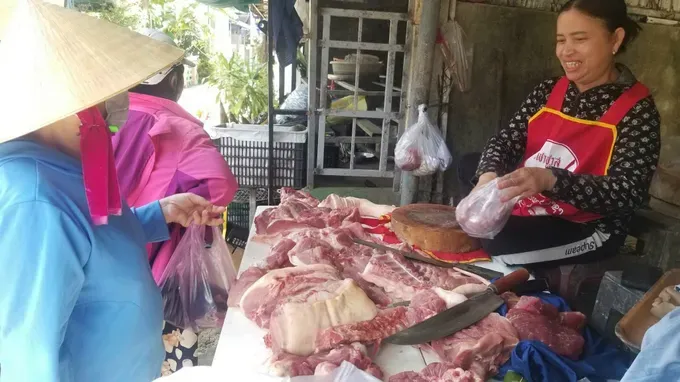
Deputy Minister Phung Duc Tien also warned the public on the grave situation if ASF were not controlled effective, transforming into an epidemic. During the major outbreak in 2019-2020, Vietnam’s livestock industry was forced to cull nearly 9 million tonnes of pork. The resulting supply shortage had a severe impact on the market and people’s lives. The consumer price index for April 2020 shot up to 6.73 percent. That was an extremely high figure, which shows the profound effect this disease can have on the entire economy.
Serious as it is, several farmers still hold a skeptical view on vaccination even though Vietnam is the first nation in the world to successfully develop an ASF vaccine. While the licensed ASF vaccine is reported to be highly effective, confidence has been damaged.
This is because some farms misused it on incorrect subjects, like pregnant sows, against veterinary warnings. This led to adverse incidents that eroded farmer trust. To fix this, a new, universal vaccine safe for both fattening pigs and breeding stock is the solution. Officials expect this new vaccine to be ready for mass use starting in October 2025.
Sadly, there are still difficulties for farmers and businesses to access vaccine sources, since various localities haven’t been decisive enough in their direction and haven’t allocated budgets for vaccination. Furthermore, the recent implementation of the new two-tier local government model has, in some areas, left a gap in the commune-level veterinary force.
If these organizational, budgetary, and personnel hurdles can be overcome, vaccine coverage will increase significantly. That will, in turn, stabilize the livestock industry and reduce the risk of future outbreaks.
On August 6, the Ministry of Agriculture and Environment reported to Prime Minister Pham Minh Chinh and Deputy Prime Minister Tran Hong Ha on the ASF situation. According to the report, the disease is currently active (within the last 21 days) in 694 communes across 33 of the nation’s 34 provinces and cities.
Ministry leaders noted that while the epidemic trended upward in the first three weeks of July, it has since leveled off thanks to decisive action from the government. However, the risk of a major resurgence remains high.
The Ministry has proposed that the Prime Minister direct all relevant bodies to strengthen coordination, strictly handle violations, consolidate the national veterinary system, especially at the commune level, and allocate funds to support affected farmers.













